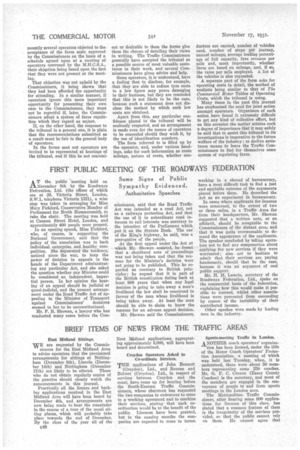FIRST PUBLIC MEETING OF THE ROADWAYS FEDERATION
Page 70

If you've noticed an error in this article please click here to report it so we can fix it.
Some Signs of Public Sympathy Evidenced. Authoritative Speeches AT the public 'meeting held on November 9th by the Roadways Federation, Ltd. (the offices of which are at 39, Victoria Street, London, S.V47.1, telephone Victoria 1321), a wise step was taken in arranging for Miss Mary Pickford, Conservative Member of Parliament for North Hammersmith, to take the chair. The meeting was held at Cannon Street Hotel, London, and approximately 400 people were present.
In an opening speech, Miss Pickford, who, of course, is supporting the National Government, said that the policy of the association was to back individual enterprise and healthy competition. She deprecated the tendency; noticed since the war, to keep the power of decision in appeals in the hands of the Department administrating any particular Act, and she asked the question whether any Minister could be considered an independent, impartial person. In her opinion the hearing of an appeal should be judicial or quasi-judicial, and the present arrangement under the Road Traffic Act of appealing to the Minister of Transport against Commissioners' decisions seemed to her to be unconstitutional.
Mr. P. B. Showan, a lawyer who has conducted many cases before the Corn missioners, said that the Road Traffic Act was intended as a road Act, not as a railways protection Act, and that the use of it to subordinate road interests to rail interests was contrary to the intention of the Parliament which put it on the Statute Book. The use of the King's highway, he said, was a prerogative of the people.
At the first appeal under the Act at which Mr. Showan assisted, he found that a shorthand note of proceedings was not being taken and that the reasons for the Minister's decision were not going to be published. This he regarded as contrary to British principles; he argued that it is part of the British constitution dating back at least 900 years that when any legal decision is going to take away a man's livelihood the law shall be construed in favour of the man whose livelihood is being taken away. At least the man should be able to claim to know the reasons for an adverse appeal decision.
Mr. Showell said the Commissioners, working in a shroud of bureaucracy, have a most difficult task to find a just and equitable outcome of the arguments placed before them. He described the Act as an experiment in bureaucracy.
In cases where applicants for licences were concerned, to the extent of two or three miles, in a Traffic Area far from their headquarters, Mr. Showan suggested that a written note, or an affidavit, should be acceptable to the Commissioners of the distant area, and that it was quite unreasonable to demand the appearance of the applicants. The speaker concluded by telling operators not to feel any compunction about applying for new services if they were warranted ; also not to hesitate to admit that their services are paying handsomely, should that be the case, because it was an argument of real public support.
Mr. H. H. Lawrie, secretary of the Roadways Federation, Ltd., spoke on the commercial basis of the federation, explaining how this would make it possible to succeed, whilst other associations were prevented from succeeding by reason of the instability of their contributed income.
Other species were made by leading men in the industry.












































































































